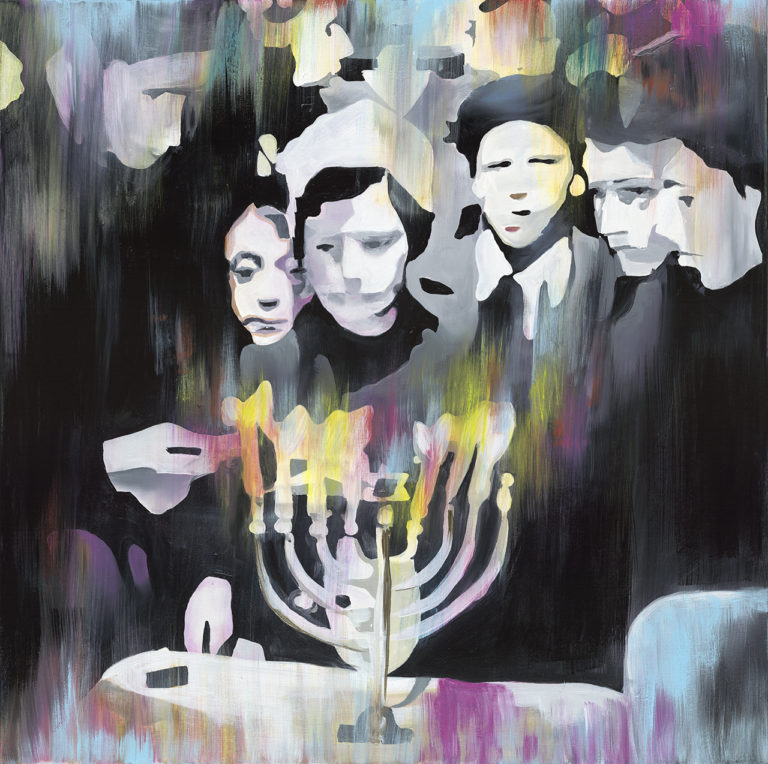
Chanukah is a wonderful holiday! We light our candles, spin that dreidel, eat all those foods that were not on the diet plan (but worth every bite). We party night after night, and most importantly, we create wonderful memories for ourselves and our families.
Chanukah fills us up with light and joy, and then we pack up our menorahs, and just like that, it is gone. Back to the grind. Back to the dark winter afternoons and the bitter-cold evenings. Back to the jingle bells on the radio and Santa in the Mall. The next Jewish holiday (Tu B’Shvat) is 6 weeks away. What will get us through the dark weeks ahead? What glimmer of light can we hold on to?
The same mitzvos that our ancestors did with such sacrifice are so difficult for us to even want to do nowadays, even though it is relatively easy to do them.
There is a powerful true story told of the Blusherabe Rebbe in the Bergen Belsen Concentration Camp. A few weeks before Chanukah, the inmates in the barracks gathered together the scraps they would need—an old shoe, some butter, some threads to use as wicks—in order to be able to do the mitzvah of lighting the Chanukah candles.
When Chanukah came, the Blusherabe Rebbe stood in the barrack, after a long day of back-breaking labor, holding the materials they had collected for weeks. Hundreds of inmates gathered around him. The Rebbe lit the makeshift candle and said the bracha: “Baruch Ata Hashem…asher kidishanu bemitzvosav v’tzivanu l’hadlik ner shel Chanukah.” He could hear the hundreds of whispered “amen”s around him.
He then went on to say the second blessing: “…she’asa nissim l’avoseinu bayamim hahem bazman hazeh.” He could feel the emotion and the tears of all the inmates around him, as they prayed to G-d to make miracles happen with them too, just as He had done in the times of the story of Chanukah.
Before he went on to the “Shehechiyanu” blessing though, he stopped. Everyone was quiet and waiting. He turned behind him, as if searching for something. He kept looking and looking around him. No one was sure what he was looking for. Was he scared a guard was coming?
Finally, he turned back to the candles and smiled, and with a strong voice, he sang the blessing: “…shehechiyanu vekiyamanu vehigiyanu lazman hazeh!” “Thank you Hashem for keeping us alive and bringing us to this moment!” Everyone answered, “Amen.”
The air was filled with this unbelievable feeling of sacrifice in their fulfillment of the mitzvah of lighting the Chanukah candles. Then one man spoke up. He said to the Rebbe, “Can I ask you a question?”
The Rebbe said, “Sure, my son. Ask!”
The man then asked, “Rebbe, I understand you made a blessing to light the candles, and you were able to fulfill the mitzvah. And I understand you made the blessing ‘Al Hanissim’. Every one of us sees miracles every day in this horrific place! Just the fact that we are alive is a miracle! But, Rebbe? ‘Shehechiyanu’? How can we bless Hashem for bringing us to this moment?”
The Rebbe looked at the man and replied, “My son, I asked myself that same question. I was not sure if it was the right thing to say that blessing. I was looking around the room for the Kloisenberger Rebbe to ask him that very question. I could not find him in the crowd, but what I did see were hundreds of eyes peering at me. Those eyes were filled with such excitement. I realized right then and there that no matter how low a Jew has fallen, no matter how difficult his situation, if he can find excitement in doing a mitzvah, then he can say the blessing of ‘Shehechiyanu’.”
As I sit in my comfortable home and complain about my first world problems, I ponder where those Jews got that strength. This story did not take place hundreds of years ago, but only a mere 75 years ago. How, in the middle of a living gehenom, did people find the desire to fulfill a mitzvah?!
When the Rebbe came to America after the war, he said, “There is no place in the world like America, where it is so easy to be a Jew! We have every freedom! But there is no place like America, where it is so hard to want to be a Jew!”
The same mitzvos that our ancestors did with such sacrifice are so difficult for us to even want to do nowadays, even though it is relatively easy to do them.
How do we make ourselves feel the excitement we used to feel for performing a mitzvah? Where is our deep desire and passion, and how do we do a mitzvah with all our heart and soul, like we used to?
We are celebrating Chanukah. Yay! We won over the Greeks.
Or did we?
The Greeks didn’t want to kill us; they just wanted to slightly disconnect us from our true inner passions.
We need to ask ourselves: What is my pulse? What is in my heart? What are my innermost desires?
We shouldn’t have to rely on the situation we find ourselves in to create the excitement.
When Chanukah is over, and there is no holiday in sight for awhile, we have Shabbos to connect to, chesed projects to get involved in, Torah learning in which to delve deeper. So much is accessible for us. All we need to do is want it. We need to find that spark deep within, and keep fanning it, expanding it, and renewing it.
I wish you all a warm winter ahead, filled with love, joy, growth, pride, and true passion for your Jewish heritage.